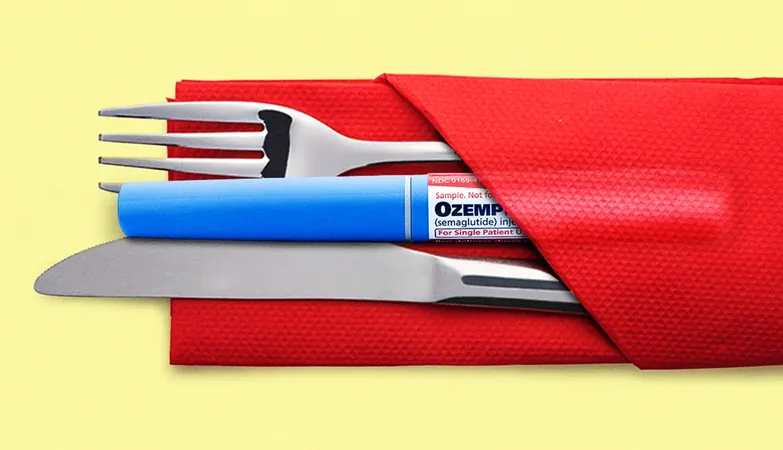
Your Daily Coffee Habit Could Cut Your Cancer Risk—Here’s What You Need to Know!
2024-12-26
Author: Daniel
New research reveals that your daily coffee ritual may offer more than just a wake-up call—it could potentially shield you from head and neck cancers. A groundbreaking study conducted by scientists at the Huntsman Cancer Institute in Utah uncovers the remarkable benefits coffee and tea may have in reducing cancer risks.
The Growing Threat: Head and Neck Cancer
Head and neck cancer is now the seventh most common cancer globally, with an alarming rise in diagnoses, especially in low- and middle-income countries. In the United States alone, the National Cancer Institute predicts that around 71,100 individuals will receive a diagnosis of oral cavity, pharynx, or larynx cancers in 2024. While tobacco and alcohol use are still the primary risk factors, researchers are increasingly looking into dietary influences, particularly the consumption of coffee and tea.
The Cancer-Fighting Power of Coffee
The researchers analyzed data from 14 different studies involving over 25,000 participants, which included nearly 10,000 cancer patients and 15,000 healthy individuals. The aim was to pinpoint dietary patterns associated with head and neck cancer.
Dr. Yuan-Chin Amy Lee, the study's senior author, noted, “While there has been prior research on coffee and tea consumption and reduced risk of cancer, this study particularly focused on their effects across various types of head and neck cancers, even identifying positive outcomes from decaffeinated coffee.”
Coffee: A Protective Elixir Against Cancer
The study found compelling evidence that coffee drinkers enjoy reduced risk for head and neck cancers. Here’s a closer look at the findings:
Overall Risk Reduction: Individuals consuming four or more cups of coffee daily exhibited a 17% lower risk of developing head and neck cancers compared to non-coffee drinkers.
Specific Cancer Types:
Oral Cavity Cancer: Coffee drinkers demonstrated a 30% reduction in risk.
Throat Cancer: The risk of developing throat cancer was reduced by 22% among coffee enthusiasts.
Hypopharyngeal Cancer: Those who indulged in 3-4 cups daily saw a staggering 41% decrease in risk for this aggressive cancer type.
Decaffeinated Coffee: Even decaffeinated coffee provides significant protective effects, with drinkers showing a 25% lower risk of oral cavity cancer.
Tea: A Mixed Bag of Benefits
Interestingly, tea also presented some protective benefits. Drinking tea correlated with a 29% decrease in hypopharyngeal cancer risk. However, an increase in laryngeal cancer risk was observed when consuming over one cup, suggesting that factors like beverage temperature might play a crucial role.
Coffee's Other Health Benefits
Beyond its potential to combat cancer, coffee boasts over 2,000 bioactive compounds, including antioxidants and anti-inflammatory agents like chlorogenic acids. These compounds are associated with lower risks for cardiovascular disease, type 2 diabetes, and inflammation-related ailments. Some studies even suggest these compounds might help tackle anxiety and PTSD.
Looking Ahead: A Holistic Approach
While the findings from this study are promising, experts emphasize the complexity of caffeine consumption habits, underscoring the necessity for further research into the nuanced effects of coffee and tea on health.
As rates of head and neck cancers decline in wealthier nations due to improved healthcare and HPV vaccinations, they continue to pose a significant threat in lower-resource areas. Public health initiatives targeting tobacco and alcohol use, alongside early detection efforts and education campaigns, will be vital in managing and reducing cancer incidences.
So, the next time you pour yourself a steaming cup, remember that your morning coffee might just be more than a caffeine kick—it could be an ally in cancer prevention! As further research sheds light on the relationship between diet and disease, individuals can make informed choices to enhance their health.
For updates on the latest health research and more engaging articles, stay tuned!

 Brasil (PT)
Brasil (PT)
 Canada (EN)
Canada (EN)
 Chile (ES)
Chile (ES)
 Česko (CS)
Česko (CS)
 대한민국 (KO)
대한민국 (KO)
 España (ES)
España (ES)
 France (FR)
France (FR)
 Hong Kong (EN)
Hong Kong (EN)
 Italia (IT)
Italia (IT)
 日本 (JA)
日本 (JA)
 Magyarország (HU)
Magyarország (HU)
 Norge (NO)
Norge (NO)
 Polska (PL)
Polska (PL)
 Schweiz (DE)
Schweiz (DE)
 Singapore (EN)
Singapore (EN)
 Sverige (SV)
Sverige (SV)
 Suomi (FI)
Suomi (FI)
 Türkiye (TR)
Türkiye (TR)
 الإمارات العربية المتحدة (AR)
الإمارات العربية المتحدة (AR)